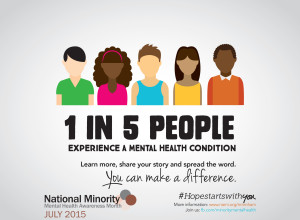Part 2 – Emily’s Story: Seeking Help in an Imperfect Mental Health System
By Emily Wu Truong
In honor of July as National Minority Mental Health Awareness Month, Guest Blogger Emily Wu Truong, who received a fellowship from the Entertainment Industries Council’s Mental Health Journalism Fellowship, created this three-part series on Asian American mental health. This is the second article of the three-part series about perfectionism and mental health.
Growing up, I had no idea how to define myself or love myself. I had no concept of understanding my true worth as an individual because I was so critical of myself. I realized that I hardly ever complimented myself and always needed that external validation from others. However, it was not until my breakdowns in July 2013, that I had breakthrough moments of epiphany, like a spiritual awakening of my true identity.
This awakening began two years ago after dealing with many frustrating circumstances. I came to a place in my life where I was sick and tired of being sick and tired. I set myself on a mission to learn how to deactivate my emotional triggers. Once I made that decision, a mixture of painful repressed memories came rushing into my conscientiousness. Emotionally, it was rather overwhelming that I would leave my brain feeling completely mentally exhausted. These breakdowns then prompted me to seek initial help from the mental health system.
Without anyone to provide me with an orientation to the mental health system, trying to navigate the mental health system was extremely frustrating.
 Although I had health insurance last year through my husband’s work, there was no way I was going to meet the high deductibles to gain affordable mental healthcare. The deductible was $3,000.00 for in-network providers and $6,000.00 for out-of-network. As a married woman, I was not poor enough to quality for services from the county, and I was not rich to pay regular price, where each session costs over $100.00 to $400.00. For me, there was no justification for me to spend exorbitant amounts of money for each session with money I did not have since I was without a job. I was told mental health clinics offering sliding scale prices could offer lower prices per session, but even so, find those places was wearisome. During my three-day mental breakdown in August, I developed insomnia for my first time, and I tried to help myself by making over sixty phone calls to different places that could provide referrals for local mental health services. Each place I called somehow left me with an unsettling feeling because I felt like each phone call I made, the person on the other end would say, “Sorry,we can’t help you. Here’s another number,” and the more I heard this upsetting statement, the more depressed I became. I felt like a victim isolated from receiving affordable help from the mental healthcare system. Even when I told members of the mental health field about these struggles,one person said that I should state that I am suicidal in order to get the help that I need sooner. Another suggested that I consider temporarily divorcing my husband. Nonetheless, these were not options that I wanted to consider.
Although I had health insurance last year through my husband’s work, there was no way I was going to meet the high deductibles to gain affordable mental healthcare. The deductible was $3,000.00 for in-network providers and $6,000.00 for out-of-network. As a married woman, I was not poor enough to quality for services from the county, and I was not rich to pay regular price, where each session costs over $100.00 to $400.00. For me, there was no justification for me to spend exorbitant amounts of money for each session with money I did not have since I was without a job. I was told mental health clinics offering sliding scale prices could offer lower prices per session, but even so, find those places was wearisome. During my three-day mental breakdown in August, I developed insomnia for my first time, and I tried to help myself by making over sixty phone calls to different places that could provide referrals for local mental health services. Each place I called somehow left me with an unsettling feeling because I felt like each phone call I made, the person on the other end would say, “Sorry,we can’t help you. Here’s another number,” and the more I heard this upsetting statement, the more depressed I became. I felt like a victim isolated from receiving affordable help from the mental healthcare system. Even when I told members of the mental health field about these struggles,one person said that I should state that I am suicidal in order to get the help that I need sooner. Another suggested that I consider temporarily divorcing my husband. Nonetheless, these were not options that I wanted to consider.
Although I could not find immediate help, I was still determined to not give up on seeking help for myself as depressing as the situation seemed.
Read Part 1: Emily’s Story – Living with Perfectionism & Depression
Stay tuned for Part 3: Finding Hope in Support Groups.
ABOUT THE AUTHOR: Emily Wu Truong is a Motivational Speaker for Mental Health Awareness, holding a Bachelor’s Degree in Psychology & Social Behavior from UC Irvine. As an outspoken advocate, Emily was elected as Chair of the Asian Coalition and serves on the Client & Family Leadership Committee for the Mental Health Services Oversight & Accountability Commission (MHSOAC) in Sacramento. As a motivational speaker, Emily has been invited to speak at USC, UCLA, UC Irvine, & Raytheon. She is best known for her speeches “Believing in Me: My Journey to Finding My Self-Worth” and “Breaking Down the Walls of Perfectionism.” In March 2015, in recognition of March as Women’s History Month, Emily was selected for the 2015 Woman of the Year Award for Senator Ed Hernandez’s 22nd Senate District. Emily has become a role model, demonstrating self-initiative and an indomitable will, delivering her message that with help, there is hope.









